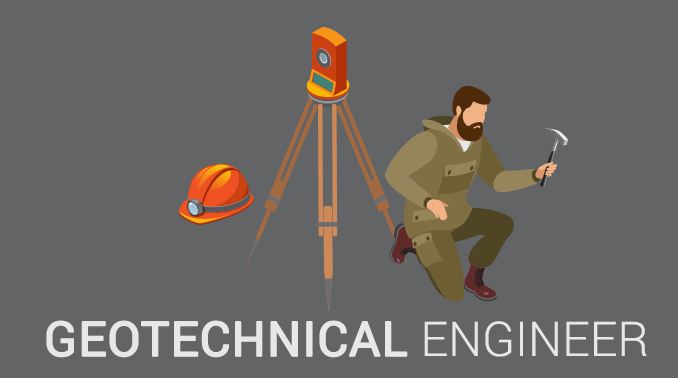Get This Report about Geotheta
Get This Report about Geotheta
Blog Article
Geotheta Things To Know Before You Buy
Table of ContentsThe 30-Second Trick For GeothetaWhat Does Geotheta Do?7 Easy Facts About Geotheta ExplainedGeotheta Can Be Fun For AnyoneGeotheta Fundamentals Explained

They conduct site investigations, accumulate examples, do lab examinations, and examine information to review the viability of the ground for building projects - Geo Tech Engineer. Based on their searchings for, geotechnical designers provide recommendations for structure layout, incline stability, keeping structures, and mitigation of geotechnical risks. They collaborate with other professionals, such as designers, structural designers, and building and construction teams, to make sure that geotechnical considerations are integrated right into the total project design and execution
By evaluating the habits and residential or commercial properties of dirt and rock, they can determine possible geotechnical hazards such as landslides, dirt negotiation, or slope instability. Their competence aids protect against failures or crashes that might endanger lives and residential or commercial property. Right here are some in-depth obligations and duties of a geotechnical engineer: Website Examination: Geotechnical designers conduct website examinations to gather data on subsurface problems.
They analyze the information to comprehend the properties and habits of the dirt and rock, including their toughness, leaks in the structure, compaction attributes, and groundwater conditions. Geotechnical Analysis and Style: Geotechnical engineers analyze the information accumulated during website examinations to analyze the stability and suitability of the website for building projects. They carry out geotechnical computations and modeling to review variables such as bearing ability, settlement, slope stability, lateral planet stress, and groundwater flow.
How Geotheta can Save You Time, Stress, and Money.
Foundation Design: Geotechnical engineers play an essential duty in designing structures that can securely support the designated framework. They assess the soil problems and load demands to determine the appropriate structure kind, such as superficial structures (e.g., grounds), deep foundations (e.g (https://www.brownbook.net/business/52934980/geotheta/)., heaps), or specialized techniques like dirt improvement. They consider elements such as negotiation limitations, birthing capacity, and soil-structure interaction to develop ideal structure styles
They examine building plans, screen website activities, and perform area assessments to confirm that the style recommendations are followed. If unexpected geotechnical problems emerge, they assess the circumstance and provide recommendations for remediation or modifications to the design. Threat Analysis and Mitigation: Geotechnical designers assess geotechnical hazards and risks related to the project site, such as landslides, liquefaction, or soil disintegration.

Collaboration and Interaction: Geotechnical designers function closely with other specialists included in a job, such as engineers, structural engineers, and building and construction teams. Efficient interaction and cooperation are necessary to incorporate geotechnical factors to consider right into the overall project design and building and construction process. Geotechnical designers offer technological know-how, solution queries, and make sure that geotechnical needs are satisfied.
Not known Facts About Geotheta
Below are some kinds of geotechnical designers: Structure Engineer: Foundation designers specialize in making and analyzing structures for structures. They evaluate the dirt problems, tons needs, and website characteristics to establish the most proper structure type and design, such as superficial structures, deep foundations, or specialized strategies like heap structures.
They assess the aspects influencing incline stability, such as soil homes, groundwater conditions, and slope geometry, and establish strategies to avoid slope failures and reduce risks. Earthquake Engineer: Earthquake engineers focus on assessing and developing frameworks to hold up against seismic pressures. They analyze the seismic danger of a website, examine soil liquefaction capacity, and establish seismic style standards to ensure the safety and security and strength of structures during quakes.
They do area testing, collect examples, and assess the collected data to identify the dirt residential or commercial properties, geologic formations, and groundwater problems at a site. Geotechnical Instrumentation Designer: Geotechnical instrumentation designers focus on monitoring and determining the actions of dirt, rock, and frameworks. They set up and keep instrumentation systems that monitor elements such as link soil negotiation, groundwater levels, incline motions, and structural displacements to assess efficiency and supply early cautions of prospective problems.
Getting The Geotheta To Work
They conduct examinations such as triaxial examinations, combination tests, direct shear tests, and leaks in the structure tests to collect data for geotechnical analysis and layout. Geosynthetics Engineer: Geosynthetics designers concentrate on the layout and application of geosynthetic materials, such as geotextiles, geogrids, and geomembranes. They make use of these materials to boost soil stability, reinforce slopes, offer drain services, and control disintegration.
They tend to be investigative individuals, which means they're intellectual, reflective, and curious. They are interested, systematic, reasonable, logical, and rational. Some of them are additionally social, meaning they're kind, charitable, participating, patient, caring, useful, empathetic, skillful, and pleasant - Geo Tech Engineer.
In the workplace setting, geotechnical engineers make use of specialized software program devices to perform computations, develop styles, and assess information. They prepare records, testimonial job specifications, connect with customers and group members, and coordinate project tasks. The workplace setup supplies a favorable atmosphere for study, evaluation, and partnership with other specialists involved in the task.
Getting The Geotheta To Work
They often go to project sites to perform website examinations, assess geotechnical conditions, and collect information for analysis. These sees include taking a trip to various places, sometimes in remote or challenging surfaces. Geotechnical designers may carry out soil tasting, conduct tests, and monitor building and construction tasks to ensure that the geotechnical elements of the task are being executed appropriately.
Geotechnical engineers likewise function in specialized geotechnical research laboratories. In these centers, they perform experiments, carry out tests on dirt and rock examples, and examine the design homes of the materials. Geotechnical lab engineers function thoroughly in these environments, dealing with testing tools, operating instruments, and taping data. They collaborate with other lab team to make certain accurate and trusted testing results.
Report this page